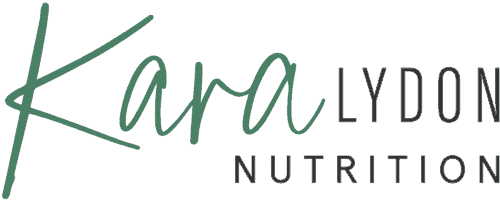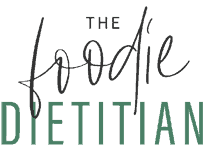When it comes to intuitive eating, we talk about listening to your body to determine when to eat, so is there a place for an eating routine and structure with intuitive eating? In today’s post, we’re tackling the question, is sticking to an eating routine good or bad?

Stick to an eating schedule!
Be more flexible with food!
You’ve heard versions of both of these before but which advice do we follow? The answer is…it depends.
It depends on the person.
What is your normal tendency? Do you thrive on routine and get easily stressed when you have to make changes to your eating plan? If you find yourself relying too much on strict eating routines, it might be a good idea to challenge yourself and switch things up from time to time to practice flexibility. If, on the other hand, your eating feels chaotic and there’s no consistency at all, it might be good to test out some structure. The reality is our bodies like consistency. They like knowing when to expect food and to be nourished accordingly. In this respect, having some gentle structure to your eating routine can be a positive thing, as long as it’s not taken to an extreme where it causes you stress and anxiety.

Where you are in your relationship with food and your body is a big indicator of whether or not you’ll benefit from an eating routine. For those who are in the early stages of eating disorder recovery, routines are highly beneficial. When someone has been in their ED for awhile, hunger and fullness cues aren’t going to be reliable. Sticking to an eating plan during this period will help to fuel your body appropriately. If you simply wait to feel hungry when you don’t have accurate hunger cues, you won’t be eating enough! A schedule can also help support your metabolism and digestion as your body recovers.
(If you’re a little farther along in recovery and feeling ready to take on new food challenges, my free guide on how to make peace with carbs can be a helpful next step!)

For others who perhaps have a highly structured eating routine, due to a diet or “lifestyle program”, aka diet, a less structured approach like intuitive eating can be helpful to heal your relationship with food and allow food to stop taking up so much mental space. With intuitive eating, you’ll have more room for flexibility and spontaneity with food and veering off the plan won’t cause you as much distress.
And if you are recovering from an eating disorder, you can still practice some of the principles of intuitive eating that aren’t related to hunger/fullness, like discovering satisfaction from foods, rejecting black-and-white mentality, challenging the food police, honoring your feelings, and making peace with food. As you go through recovery, learn hunger and fullness cues, and become comfortable with listening to your body in terms of when and what to eat, eating intuitively is much more feasible.
When my clients come to see me and they aren’t nourishing their body enough, we often start with implementing some gentle structure, like eating every 3 hours or so. I explain to them that this is like putting a cast on a broken bone to help it heal. Once the bone is completely healed, they can take off the cast. Once they are nutritionally restored, they can move from the gentle structure to listening to their bodies.

Even if you are working towards intuitive eating or consider yourself an intuitive eater, I don’t think there’s anything wrong with practicing some gentle structure or routine. For instance, planning out dinners for the week so that you can grocery shop sets yourself up for less guesswork during the week and can be an act of self care. The difference is when you’re an intuitive eater, there’s room for flexibility to change up the plan if you feel like it.
As you can see, establishing an eating routine is all about the individual. You gotta do a little bit of self-exploration here to know what’s going to work for you and when. If your eating disorder or diet rules are still too loud, establishing a consistent eating routine (with the help of an eating disorder or intuitive eating dietitian) can be an important first step in learning to listen to your body. On the other hand, if you understand your hunger and fullness but stick too much to foods that feel safe, it might be helpful to push yourself a little more into intuitive eating and honoring your cravings regardless of the plan for the day. I hope that no matter where you are in your intuitive eating or recovery journey, you can recognize what your mind and body need right now. Routines aren’t good or bad, they are sometimes needed and sometimes not!
Tell me, what did you take away from this post? When does an eating routine serve you and when does it not?
This post was originally published in August 2015 and has been updated to give you the most valuable content!


This is such an insightful post. As a new mom I am struggling with a routine, but I’m definitely motivated to get into one!
Oh I’m sure, Shannon! Must be such an adjustment for routine!
My schedule tends to be chaotic. I wish I had more routine in my eating pattern. That’s just something I will have to prioritize and work on.
Thanks for sharing, Amy!
Such an interesting topic! You do such a great job at explaining this. Thank you so much!
Thanks, Katey!
Such an important post! In the early days of recovery, patients simply can’t trust their own bodies to provide accurate cues yet.
Thanks, Whitney!
This is so interesting to read and such great points!
Thanks, Erin!
Really interesting viewpoint and info. Thanks for sharing 🙂
Thanks, Lauren. xo
Great post! Sharing with my online course now as we had some discussion about this already this week!
Thanks for sharing, Kelly! <3
Great post Kara! I know for me, it totally depends and I do both. Sometimes my body likes routine and sometimes it doesn’t.
Thanks, Lindsey!
Would LOVE to learn more about Ayurveda! Someone actually asked me about it yesterday 🙂
Cool! I’ll definitely get a post up about it soon.
I think everyone needs some sort of routine and structure. Otherwise things are too haphazard and chaos ensues!
A little structure and routine is always a good thing.
Great post! I usually stick to a routine but I think I can defintley benefit from trying different exercises and playing it by day, For example, If I don’t feel like running one morning, I should probably do an exercise that will make me feel good like yoga or biking!
Thanks, Rachel! It’s all about finding that balance.
This is really interesting! I’m like you and really like having the same snack/meal times during the day and I eat similar snacks and foods almost every week. It just keeps me consistently healthy. Of course we go out one or two nights a week too, which is a routine but isn’t at the same time! Gives us the diversity we need. http://www.ourfoodieappetite.com/lubo-review-virginia-beach-chicks-beach/
Cool. Thanks for sharing, Kait!
SO interesting! I never knew ANY of this and I’m always open to learning about mindfulness/meditation! I’d love to read another post on Ayurveda to learn more! Thanks Kara!
Thanks, Chelsey! I’ll definitely have to write another post about Ayurveda soon.